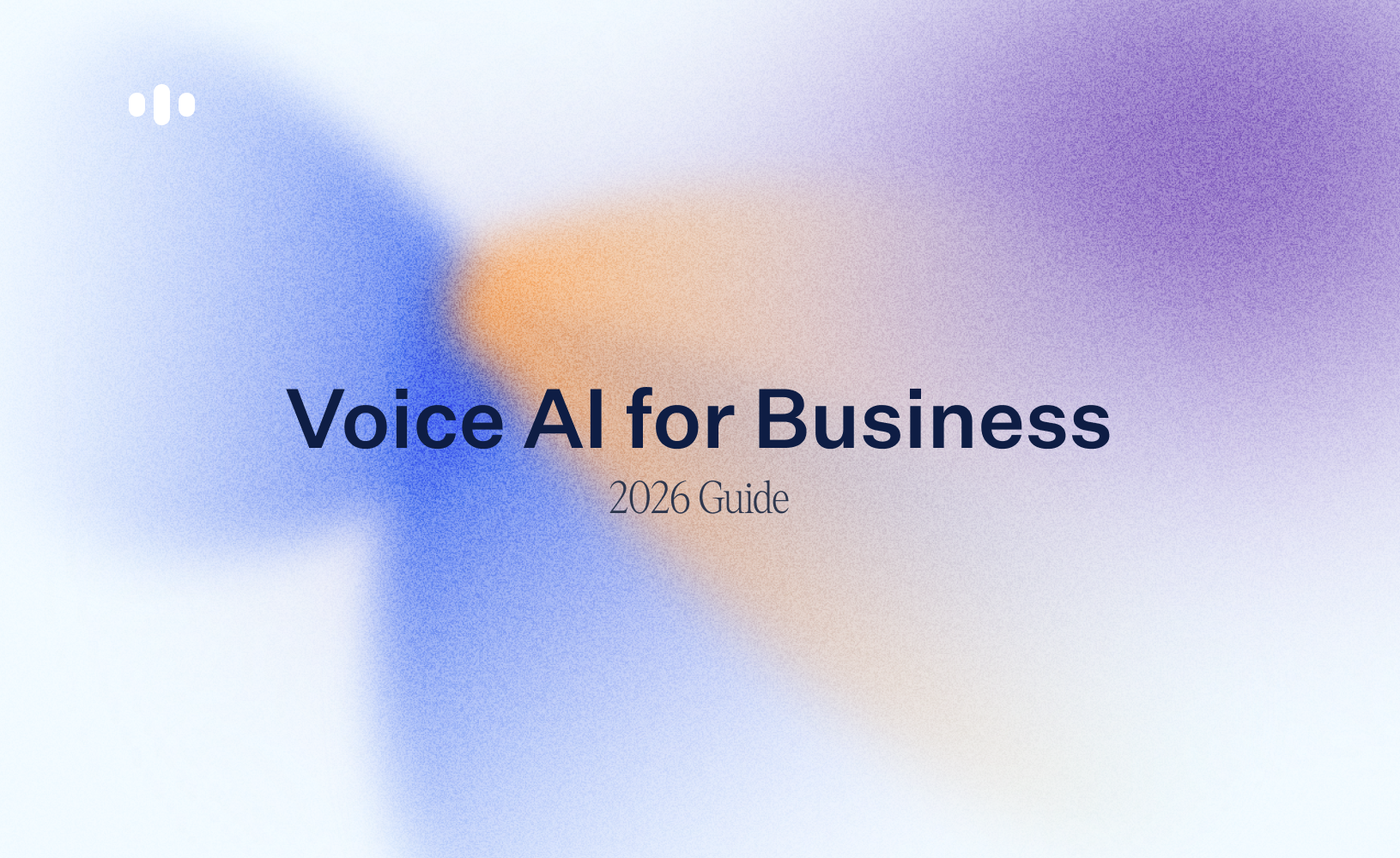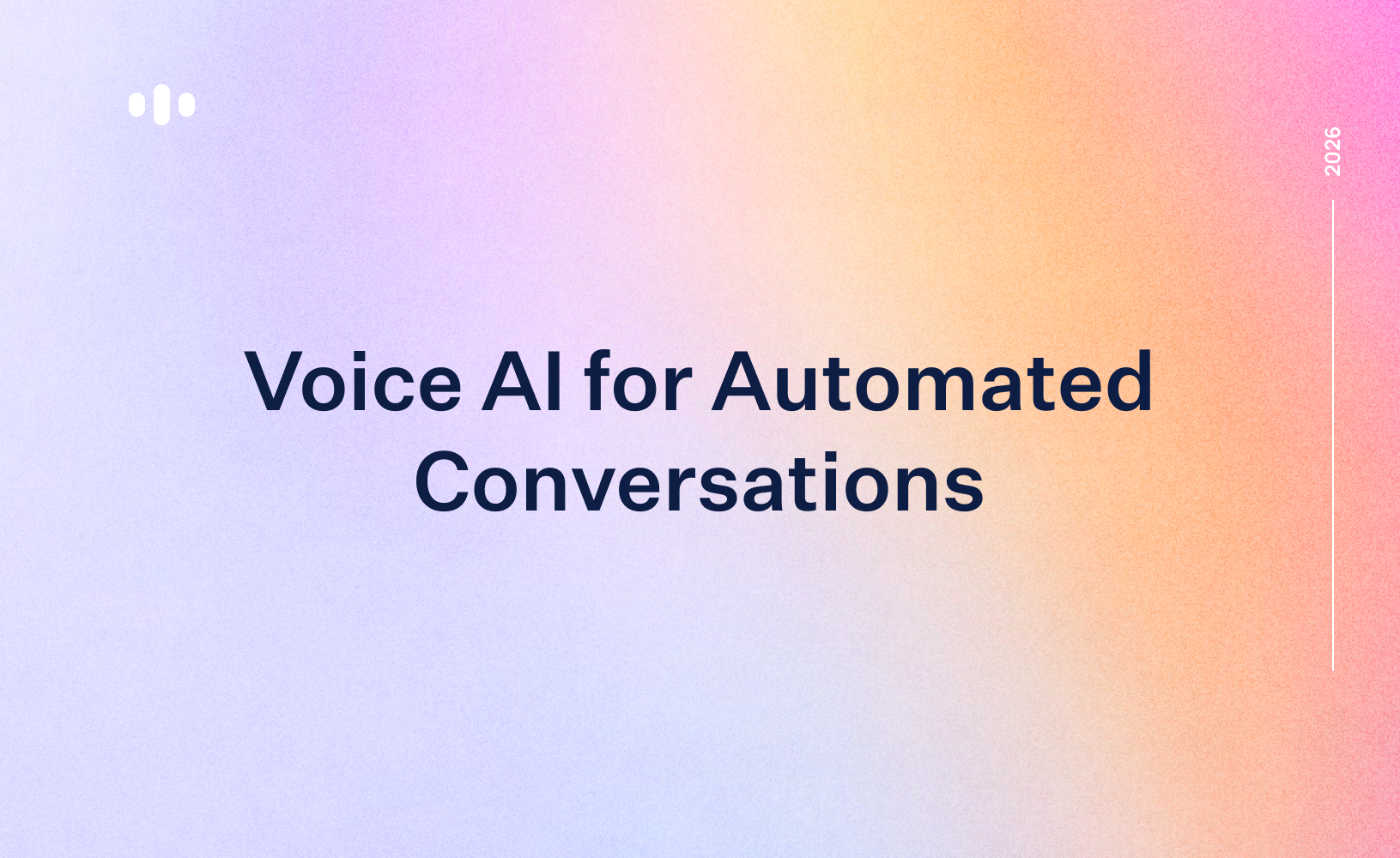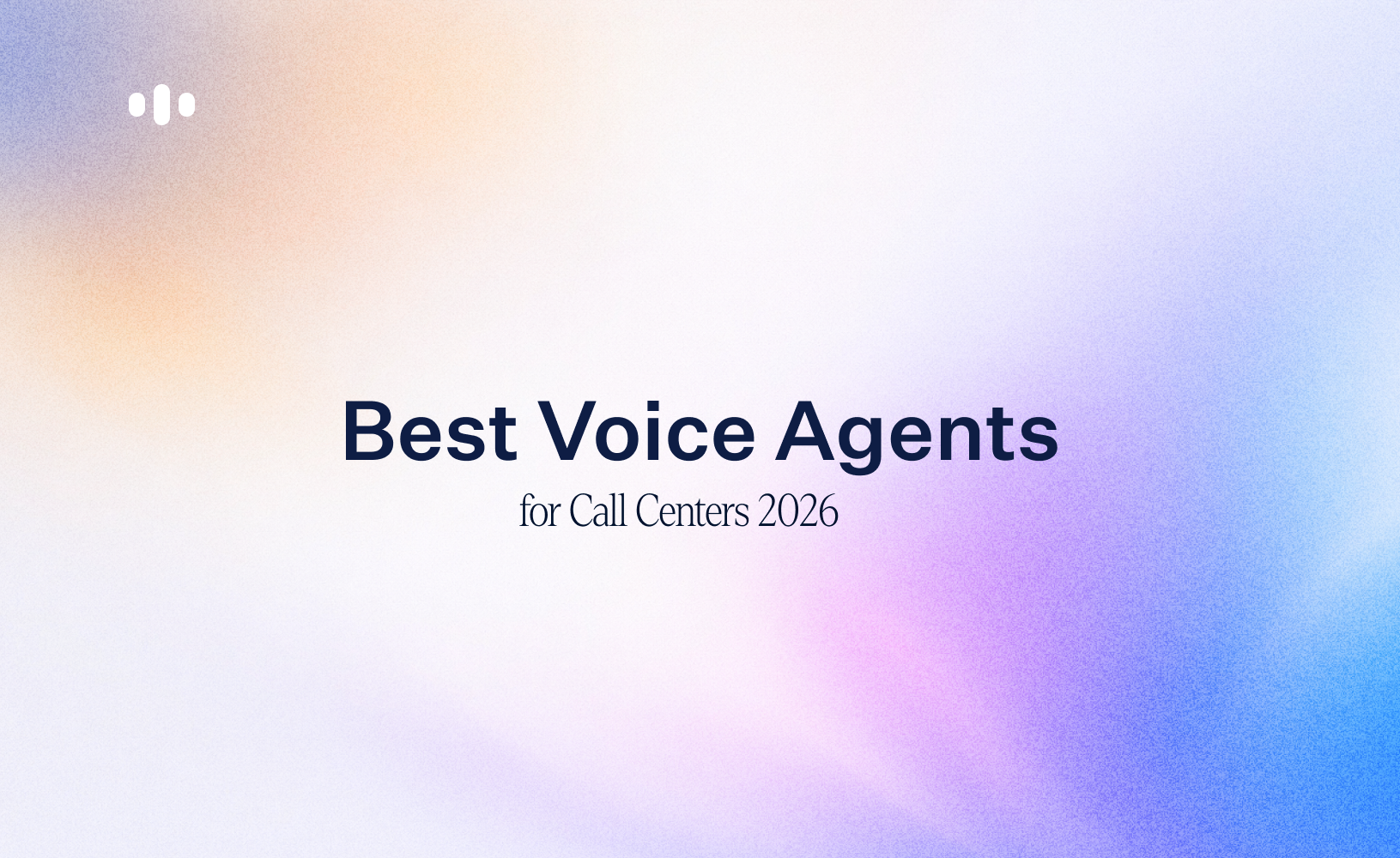Dozens of platforms promise to deliver AI agents that can book appointments, qualify leads, and manage support calls with near-human fluency. If you’re searching for a Synthflow AI alternative, this article will break down the key features and AI features that set these alternatives apart, helping you identify the best fit for your business needs.
We’ve seen many of these tools perform well in demos, but once deployed at scale, the gaps in reliability, analytics, and workflow flexibility often become clear.
Synthflow has gained momentum as a no-code solution in this space, so I’ve tested it to understand where it shines and where it struggles. While it offers an accessible builder for voice automation, we have noticed growing concerns around cost efficiency, workflow limitations, and restricted analytics visibility.
In this guide, we compare the most credible Synthflow competitors, from enterprise-heavyweights like PolyAI and Bland, to design-first tools such as Voiceflow. We want to make it simpler to figure out which platform truly matches your tech stack, growth plans, and the kind of customer experience you aim to deliver. For many businesses, the presence of true conversational AI is a key differentiator, ensuring more natural, effective, and human-like interactions.
What Is Synthflow?
Synthflow AI is a no-code AI voice platform that lets businesses build smart voice agents to handle calls, book appointments, qualify leads, and more, all via phone conversations.
It aims to give you voicebots that “feel human”, with context awareness, tone modulation, customizable voices, and integrations into CRMs or workflow tools.
Some of its features include:
- Support for multiple languages (Synthflow claims support for 30+ or 50+ languages)
- Voice cloning or tone customization options with customizable voices for different business needs
- Latency under 500 ms in many cases
- Drag-and-drop / visual builder, no-code interface for setting up voice flows
- Integrations with CRMs, webhooks, etc., offering integration capabilities, easy integration, and seamless integration
Synthflow ai also provides advanced ai phone and phone system capabilities, automating phone calls for customer support, sales, and lead management with human-like interactions.
Synthflow positions itself as a bridge between the “voice AI for engineers” world and the “no-code automation” world, with the promise of bringing phone-call–level automation into business workflows. Its free plan offers basic features for entry-level users.
Limitations of Synthflow
While Synthflow positions itself as a no-code leader in AI voice automation, recurring issues show up across G2 reviews, Reddit threads, and comparison articles.
These are the main limitations consistently highlighted by users and businesses:
In terms of pricing, Synthflow lacks transparent pricing and instead relies on custom pricing models, which can lead to hidden fees and make it difficult for businesses to predict costs.
When it comes to analytics and compliance, there are concerns about whether Synthflow fully meets industry standards for data protection and regulatory compliance.
Limitations in platform performance and responsiveness can negatively affect customer satisfaction and disrupt customer interactions, leading to reduced operational efficiency and user experience.
From a technical perspective, Synthflow's limited use of machine learning, advanced natural language processing, and ai models restricts its ability to handle complex tasks and automate sophisticated workflows.
High Pricing and Hidden Costs
Many users note that Synthflow’s pricing escalates quickly with call volume, making it hard to justify for SMBs and startups. The lack of transparent pricing and reliance on custom pricing models can make it difficult for businesses to predict costs and compare options. Several reviewers also mention the need to connect external tools to unlock full functionality, raising the total cost of ownership even further.
Limited Flexibility in Complex Workflows
Although the no-code builder is simple, some users point out that it feels rigid once you try to set up advanced branching or pass dynamic variables. The platform also struggles with complex tasks and lacks deep customization options compared to some alternatives. The result: teams are forced to patch gaps with Zapier or other middleware, which weakens the “all-in-one” promise.
Lack of Transparency and Depth in Analytics
Reviewers have also noticed that the analytics dashboard as “too basic”. For companies that need QA monitoring, deep reporting, or visibility into agent performance, Synthflow doesn’t provide the level of transparency needed to scale with confidence. Additionally, it lacks advanced features such as real-time coaching, which are available in some alternatives and can be crucial for effective communication and performance enhancement.
Voice Quality and Conversational Gaps
Even supportive reviews admit that Synthflow’s voice still “sounds robotic” in longer conversations. Latency spikes, awkward phrasing, and difficulty handling barge-ins or ambiguous requests are common pain points mentioned on G2. Unlike platforms with true conversational ai and advanced natural language processing, Synthflow’s voice agents are less likely to be mistaken for a human half or human half the time, which limits their effectiveness in delivering a natural customer experience.
Top Synthflow Alternatives for AI Voice Automation in 2025
1. Retell AI
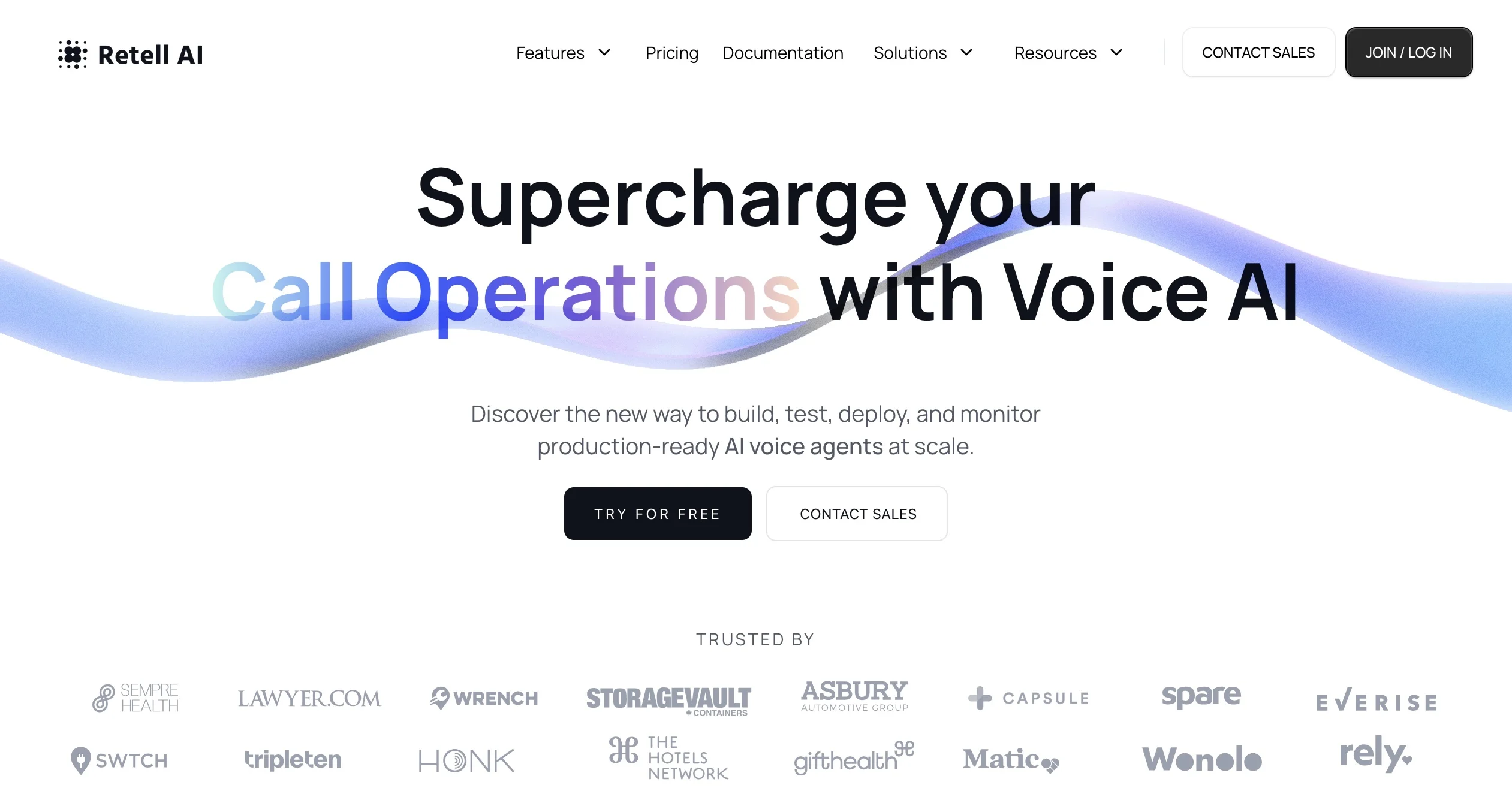
Retell AI provides a fully transparent, pay-as-you-go pricing model where businesses only pay for usage.
When searching for the best synthflow alternative, many businesses compare Retell AI with other tools and platforms that can serve as a synthflow ai alternative, considering features, deployment speed, and overall value. Some users may choose synthflow ai as their go to platform due to its versatility and comprehensive telephony features, but others look for alternatives that better fit their specific needs or offer more transparent pricing.
The platform offers sub-second latency, customizable LLM and voice selection, and an intuitive no-code builder for creating conversation flows. Retell also integrates directly with telephony providers, enabling both inbound and outbound call automation without hidden platform fees.
Advantages Compared to Synthflow:
- Up to 65% lower call costs: Retell starts at $0.07/min, compared to Synthflow’s $0.18–$0.22/min (plus overage fees).
- Phone number rental 70% cheaper: $2/month per line (vs. Synthflow’s $7–$10) and $5/month for toll-free options.
- Enterprise-grade telephony control: Full SIP trunking, batch calling (hundreds of calls at once), and warm transfers supported; Synthflow lacks these.
- Integration capabilities: Retell offers strong integration capabilities, seamlessly connecting with CRMs and sales tools for smooth workflows.
- Post-call analytics built-in: Every call auto-summarized with key insights and sentiment; Synthflow offers none.
- Knowledge base integration: Sync live data from docs or sites for contextual responses; Synthflow relies solely on memory.
- Custom LLM integration: Bring your own OpenAI, Anthropic, or local models; Synthflow restricts users to its own flows.
- Deployment speed: Teams integrate in 1–2 days vs. multi-week Synthflow setup.
- Performance at scale: Sub-second latency sustained across thousands of daily calls in industries like healthcare, finance, and retail.
Pricing
Pay-as-you-go starts at $0.07+ per minute with volume discounts down to $0.05/min for enterprise plans. Additional charges for large language models and telephony usage. Retell AI offers transparent pricing with no hidden fees, making it easy to predict costs and compare with custom pricing models. Free $10 credit and limited concurrent calls included for testing.
Number rental at only $2 per month, and toll-free numbers at only $5 per month.
G2 Rating: 4.8/5 (612 reviews)
Review: “Retell AI has completely transformed the way we manage automated calls, with impressive voice quality and understanding”.
Best for:
Startups and growth-stage businesses that want maximum cost transparency and scalability. Retell is also a strong fit for technical teams that value control over agent behavior and infrastructure, but it is equally suitable for businesses without a technical team, thanks to its ease of use and quick deployment.
Build your first Retell agent in minutes for free.
2. Bland
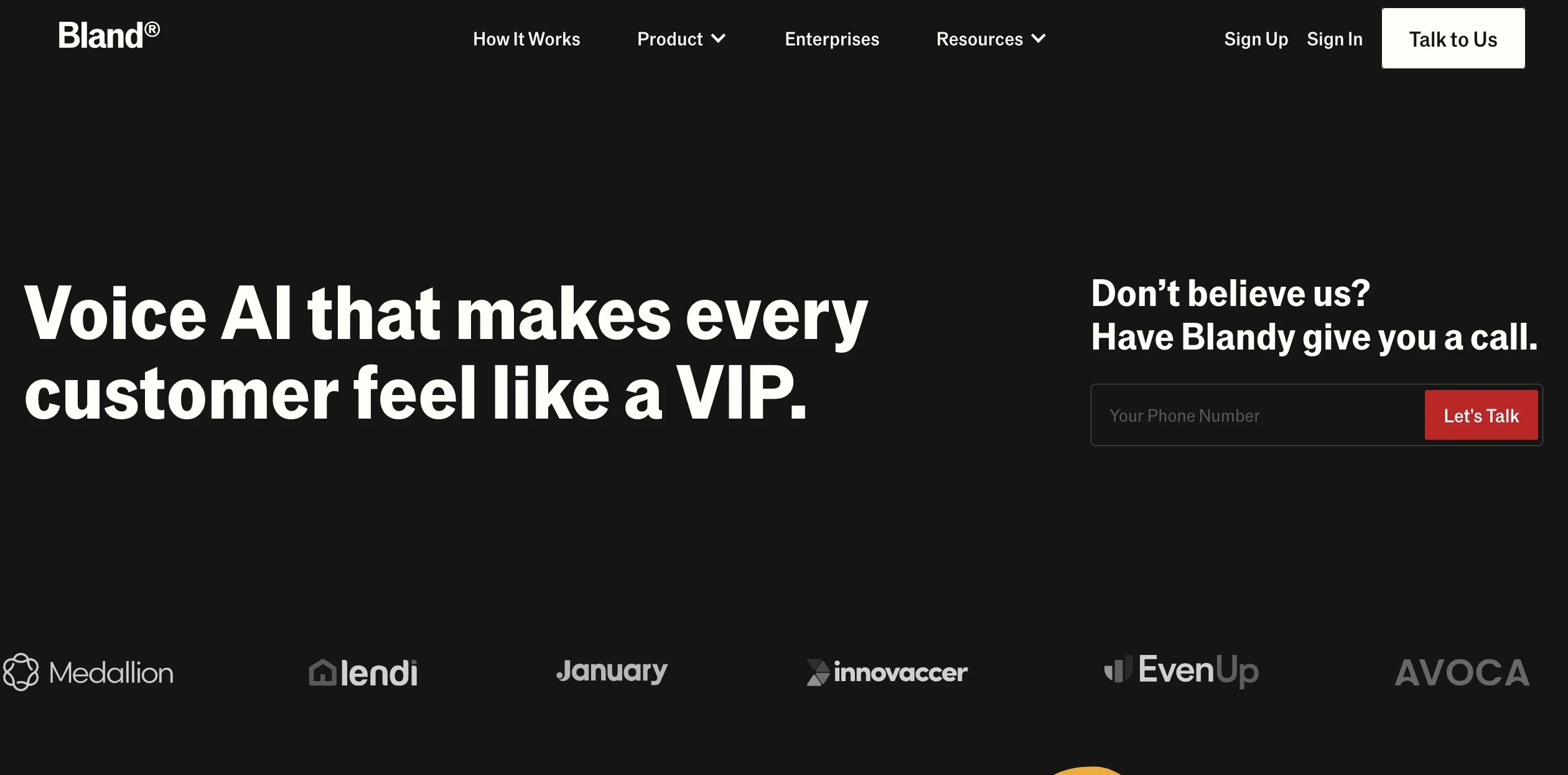
Bland emphasizes hyper-realistic voice experiences with strong security and data governance. It supports high-volume inbound and outbound calling, SMS, and omnichannel workflows. Bland markets itself as capable of scaling up to one million concurrent calls, making it attractive to enterprises that demand resiliency.
Advantages Compared to Synthflow:
- Enterprise-scale throughput: supports up to 20,000 calls per day (vs. Synthflow’s 1,000/day on standard plans), making it better suited for high-volume operations and large-scale phone calls.
- Integration capabilities with phone systems: seamlessly connects with existing phone systems to automate and enhance both inbound and outbound phone calls, supporting multi-channel communication.
- Custom integrations: offers support for custom integrations, allowing businesses to connect Bland with their preferred CRMs, sales tools, and other software, making it a strong option for building an AI appointment setter that syncs seamlessly with existing calendars and pipelines.
- Mid-call API actions: allows developers to trigger live CRM or database updates during a conversation.
- Full programmability: accepts custom code via JavaScript, Python, or cURL, enabling granular control over call logic, integrations, and post-call automation.
- Advanced AI models and machine learning: leverages state-of-the-art ai models and machine learning to improve natural language understanding, conversation analysis, and automation accuracy.
- Native LLM flexibility: lets teams plug in their own models or fine-tune Bland’s in-house LLM for lower latency and domain-specific behavior.
Pricing
No public pricing. Bland generally positions itself at the enterprise tier, with costs reflecting its scale and customization focus. Bland uses custom pricing tailored to enterprise needs, so potential customers should contact their sales team for a personalized quote.
Product Hunt Rating: 3/5 (10 reviews)
Best for:
Large enterprises with strict requirements for privacy, governance, and brand voice customization at scale.
3. Ada.cx
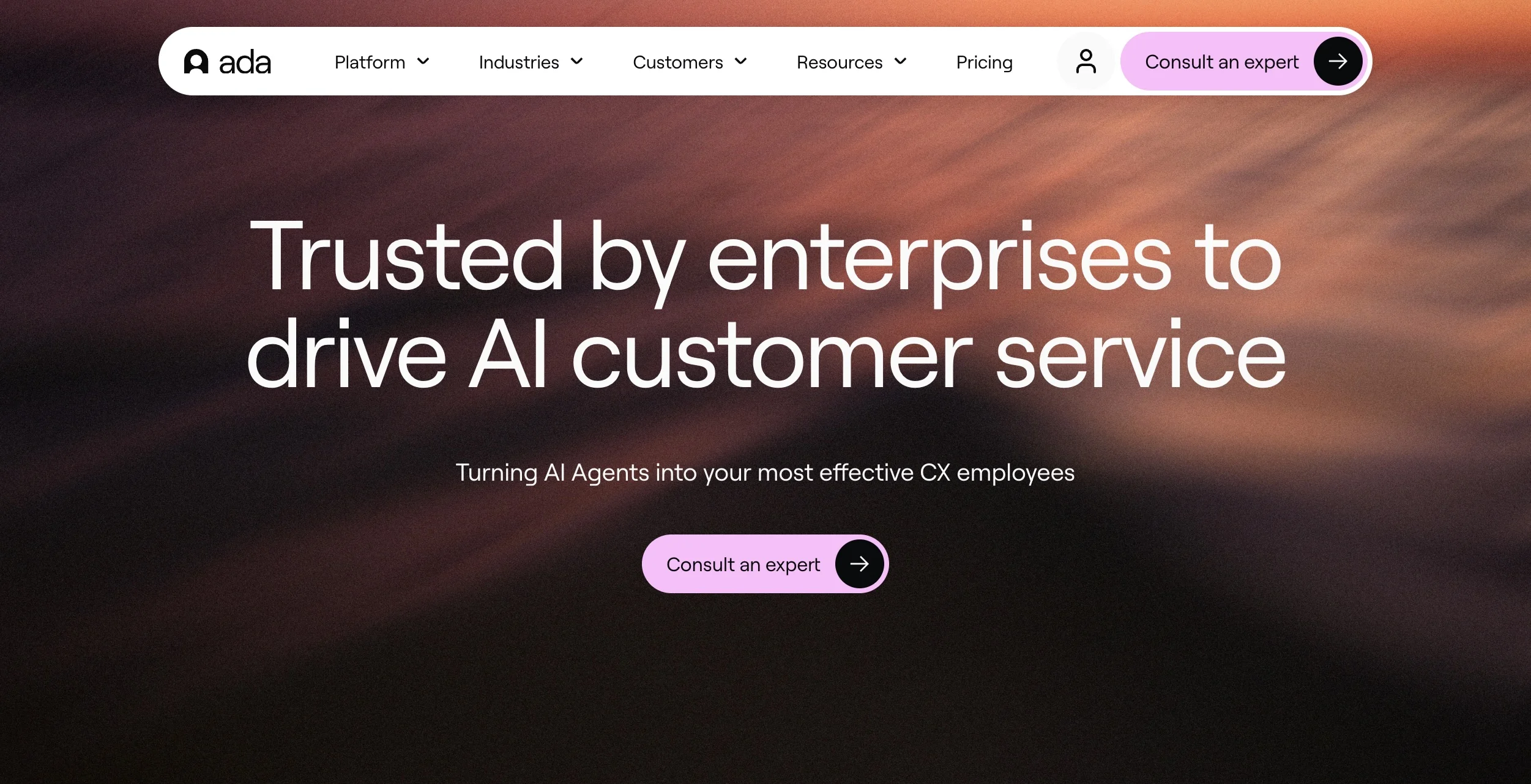
Ada.cx powers AI agents that automate customer service across chat, voice, and email, helping support teams handle complex requests at scale.
Unlike traditional bots that rely on rigid scripts, Ada’s platform was built “AI-first”, meaning its agents can understand intent, trigger workflows, and even escalate to humans when needed, all while maintaining a consistent brand tone.
Advantages compared to Synthflow
- Omnichannel coverage: Ada automates conversations across chat, email, social, messaging apps, and even phone, allowing businesses to extend their AI answering service beyond calls and into every customer channel.
- AI-first foundation: Built from the ground up for intelligent automation, Ada’s agents can detect intent, trigger workflows, and escalate to humans when needed, keeping the brand tone consistent. Its advanced AI features enhance call efficiency and operational results.
- Multilingual by default: With 50+ languages supported out of the box, Ada is ready for global teams that need seamless, localized support.
- Resolution-based analytics: Instead of just tracking replies, Ada measures how many interactions are fully resolved, giving teams real insight into ROI and automation success.
- Performance-based pricing: Companies pay based on successful resolutions or interaction volume, not flat usage fees, making it more transparent and ROI-driven than traditional pricing models.
Ada’s robust AI features and omnichannel capabilities help improve customer satisfaction by ensuring responsive, human-like interactions and efficient support across all platforms.
G2 Rating: 4.6/5 (155 reviews)
Review: “Ada helped our small support team contain the most easy-to-resolve customer inquiries, freeing-up more time for agents to go through our backlog.”
Pricing
Ada uses a performance-based pricing model, where companies pay based on successful resolutions or interaction volume rather than flat usage fees. Exact pricing depends on the number of monthly conversations, integrations, and deployment channels, but most enterprise plans start in the low six figures annually.
Recommended for:
Brands that prioritize customer experience at scale, especially e-commerce, fintech, and telecom companies, where multilingual support and fast automation setup are key.
4. PolyAI

PolyAI delivers enterprise-grade voice assistants focused on customer service.
Its model combines advanced conversational design with co-creation, where PolyAI’s team works directly with clients to align brand tone and logic. The platform emphasizes reliability in high-stakes inbound support scenarios.
Advantages Compared to Synthflow:
- Proven at scale: In hotels, poly ai has documented ~34% of reservation calls automated and deployments across major chains via partners, evidence of complex, high-volume routing and multilingual workloads.
- Enterprise language coverage: 45+ languages offered as standard, robust out of the box for global AI call centers.
- Deep integrations: PolyAI positions as an enterprise managed service with integrations into CRMs/contact center stacks.
- Demonstrated CX outcomes: Case studies highlight first-call resolution improvements and “guest-led” natural interruptions/barge-in, underscoring human-like dialog vs. template-based flows.
- Advanced features for customer service operations: PolyAI offers advanced features designed to enhance and scale customer service operations, including rapid deployment of ai voice agents, support for customizable voices tailored to industry needs, and comprehensive capabilities that go beyond basic functionalities.
Pricing
PolyAI does not publish prices. Engagements are typically custom-quoted, with enterprise budgets in mind. PolyAI uses custom pricing for enterprise clients, tailoring quotes to each organization's specific requirements.
G2 Rating: 5/5 (11 reviews)
Review: “There are many options for AI currently in the market. PolyAI impressed us by providing a product that could be launched in a short amount of time without risking quality”.
Best for:
Global enterprises seeking a turnkey solution for customer service voice AI, where premium support and co-development are essential.
5. Decagon.ai
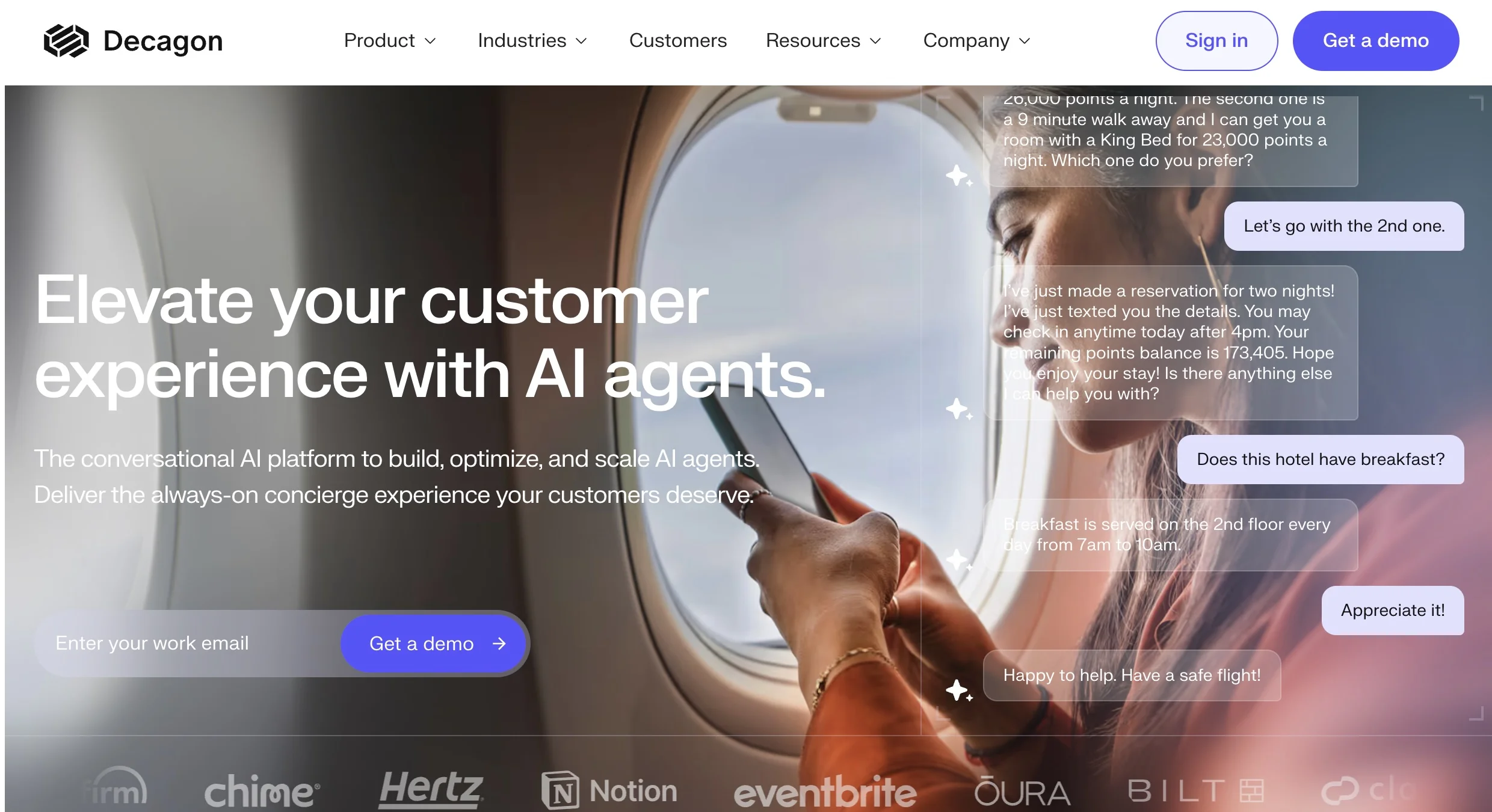
Decagon.ai offers a unified AI engine that auto-resolves customer issues across chat, voice, email, SMS, and custom channels in any language.
Their approach centers on Agent Operating Procedures (AOPs): natural-language instructions that compile into logic, allowing teams to tweak behavior without heavy coding.
Advantages Compared to Synthflow
- Full omnichannel + language support: Decagon handles chat, voice, email, SMS, and custom surfaces, with native support for multiple languages.
- Transparent observability & debugging: You can trace exactly why an AI agent made a decision at any step, audit logic paths, and detect anomalies.
- Seamless context sharing across channels: Decagon’s voice + cross-channel memory means if a user moves from voice to chat/email, the agent retains context so they don’t have to repeat themselves.
- Advanced AI models and machine learning: Decagon leverages state-of-the-art ai models and machine learning to enhance natural language understanding, conversation analysis, and automation, capabilities that make it highly suitable for complex AI telemarketing and lead-qualification workflows.
- Deep customization and custom integrations: Decagon supports deep customization, allowing extensive tailoring to business needs, and offers custom integrations for seamless compatibility with existing tools and workflows.
- Value-based pricing with per-resolution option: You can pay per conversation or only for successful resolutions (i.e. when AI resolves without human escalation), which aligns cost with outcomes.
Pricing
Decagon frames pricing around value. Their two main tiers are:
- Per-conversation pricing: You pay a flat fee per interaction (whether fully resolved or not). This is the more commonly chosen model among their customers.
- Per-resolution pricing: You only pay when the AI fully resolves a query without escalation. No cost for conversations that require human handoff.
Decagon uses custom pricing based on each client's specific needs, so you will need to contact their sales team for a personalized quote. Because Decagon is aimed at enterprise clients with large volumes, their base pricing is custom. In one public review, estimated ranges span $95,000 to $590,900+ per year, depending on complexity, volume, and integrations.
G2 Rating: 4.9/5 (18 reviews)
Review: “The biggest upside of using Decagon isn’t simply the assumption of repetitive day-to-day tasks that would normally be done manually, but that Decagon allows us to evaluate data on a much deeper level.”
Recommended for:
Organizations that demand high customization, transparency, and outcome-driven automation, especially in sectors like fintech, telecom, or SaaS with large support loads.
6. Voiceflow
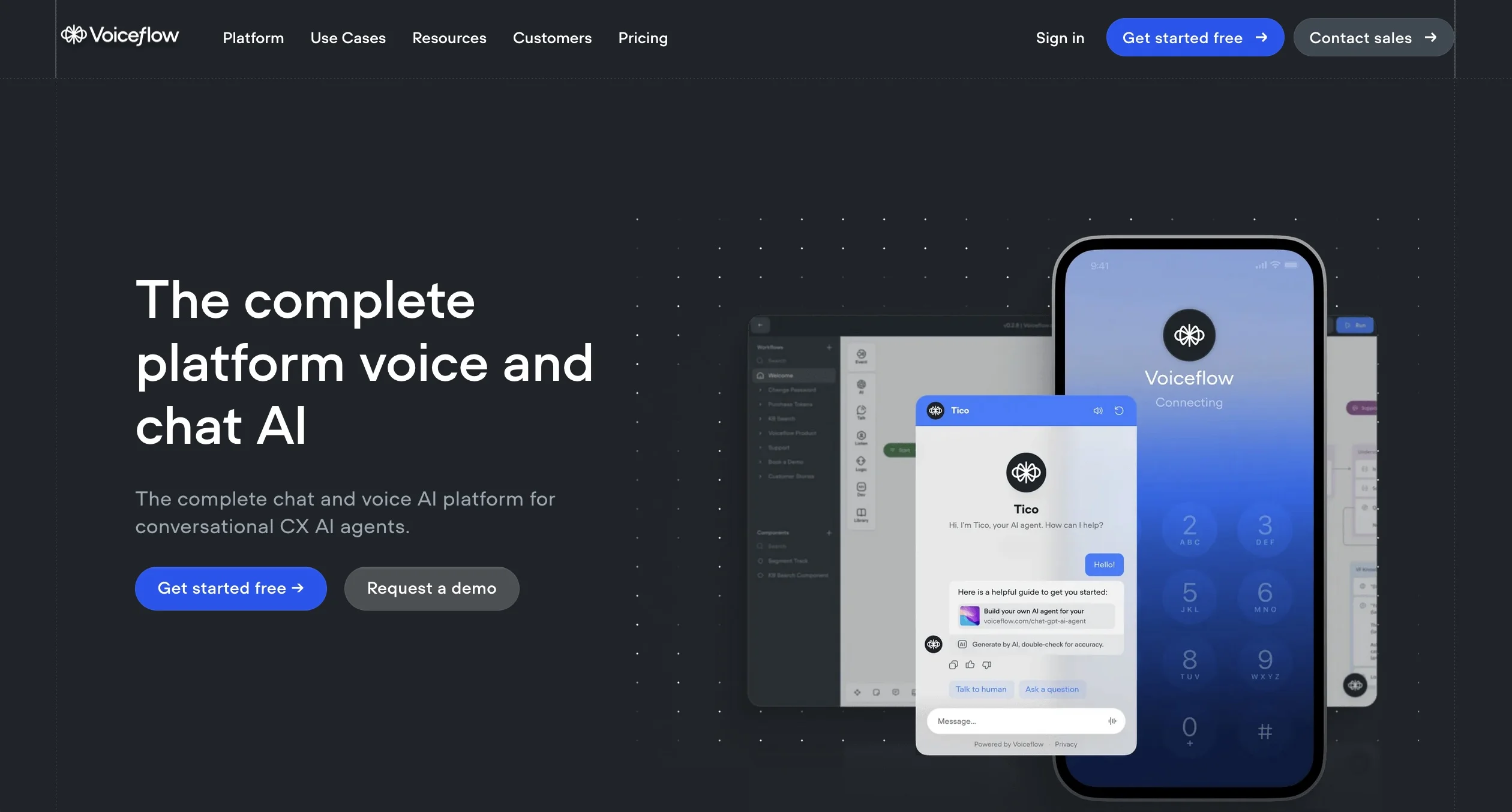
Voiceflow is a leading no-code platform for designing conversational workflows across both voice and chat.
It excels in prototyping and collaboration, allowing teams to co-design flows, manage knowledge bases, and test experiences before launch.
Advantages Compared to Synthflow:
- Built for collaboration: Voiceflow includes workspaces, roles and permissions, version history, and shared analytics, features designed for product and CX teams that need to collaborate on conversational design.
- Multi-channel design: While Synthflow focuses primarily on phone-based voice agents, Voiceflow allows teams to build and deploy both voice and chat assistants (web, WhatsApp, SMS, and more) from a single canvas, with robust support for messaging apps to enable omni-channel communication.
- Integration capabilities: Voiceflow offers easy integration and seamless integration with a wide range of tools, including CRMs and sales platforms, making it simple to connect with existing workflows and enhance operational efficiency.
- Predictable seat-based pricing: Voiceflow’s per-editor pricing offers predictable costs for design-heavy teams.
- Higher concurrency out of the box: Voiceflow’s Business plan supports up to 15 concurrent voice calls, making it easier to scale early pilots without complex telephony setup.
- Enterprise-grade governance: SSO/SAML, audit logs, and private cloud deployment options make Voiceflow better suited for regulated industries or teams with strict IT requirements.
Pricing
Voiceflow offers a free plan for basic usage. The Pro plan starts at $60 per editor/month for up to 20 agents, while the Business plan at $150 per editor/month supports unlimited agents. Enterprise pricing is available on request.
G2 Rating: 4.6/5 (58 reviews)
Review: "Good platform if you have less than 5,000 chats per month, otherwise extremely expensive".
Best for:
Startups, design teams, and innovators building prototypes or multichannel bots where iteration speed is more important than call concurrency.
7. Cognigy
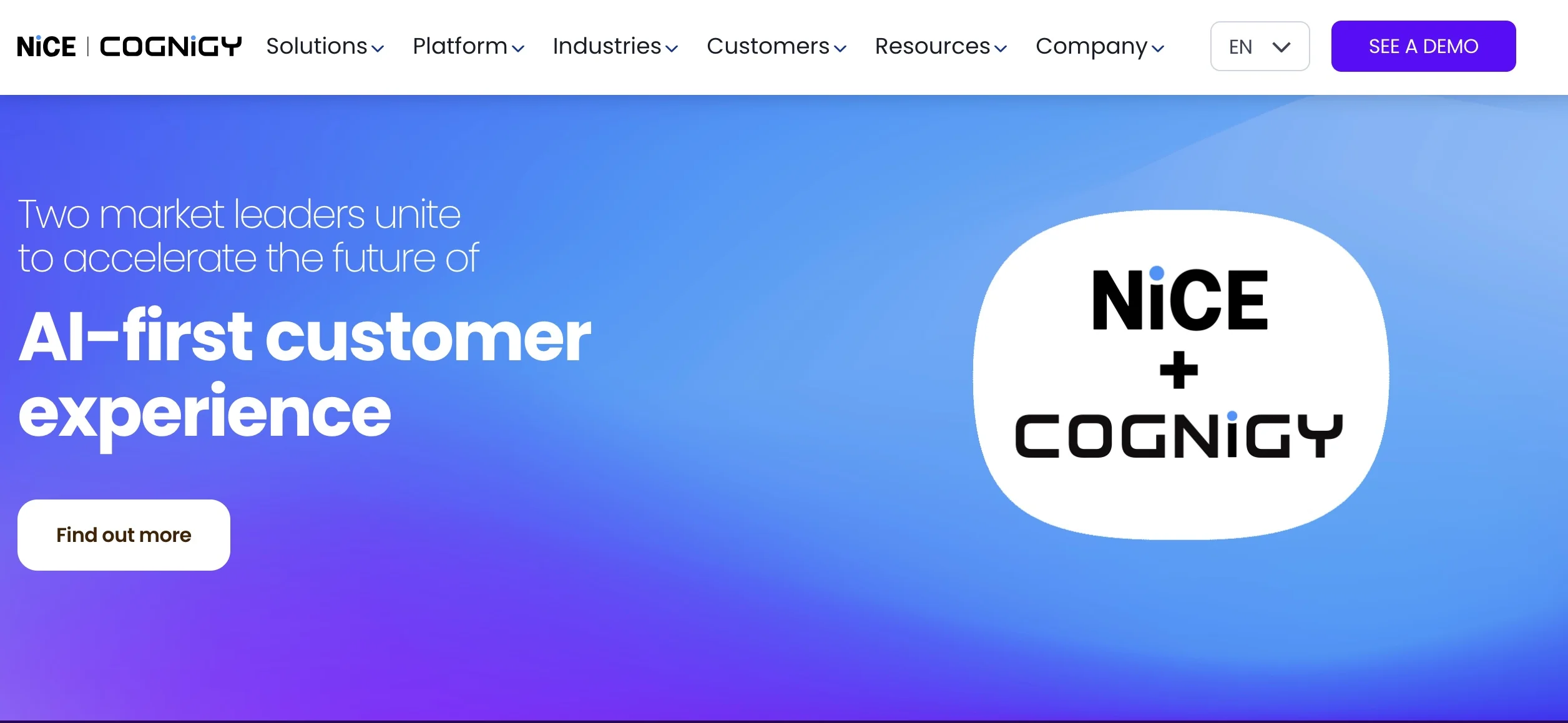
Cognigy is a conversational automation platform built for complex, enterprise-grade deployments.
It supports voice and chat channels, advanced orchestration, multilingual interactions, and customizable workflows, making it a flexible option for multinational organizations.
Advantages Compared to Synthflow:
- 100+ languages, out of the box: Cognigy markets fluent support in 100+ languages across voice and chat, enabling global rollouts without extra tooling.
- Enterprise voice stack: Native Voice Gateway with SIP/PSTN connectivity, barge-in/DTMF, AMD, and seamless handoff to agents.
- Compliance & deployment flexibility: Cognigy adheres to industry standards and compliance requirements, with documented support for SOC 2, ISO 27001, HIPAA, GDPR, CCPA, PCI DSS, plus SaaS, private cloud, and on-prem/air-gapped options.
- LLM orchestration + prebuilt enterprise connectors: A platform approach with LLM orchestration, 100+ prebuilt tools/integrations, and contact-center integrations, built to coordinate complex workflows rather than a single voice bot. Cognigy offers robust integration capabilities for seamless connection with CRMs and sales tools, as well as advanced features designed for enterprise deployments.
Pricing
Enterprise licensing, typically customized to deployment scale and channel usage. Pricing is not publicly listed, as Cognigy uses custom pricing for enterprise clients.
G2 Rating: 4.6/5 (13 reviews)
Review: “Overall I loved it but I must mention that it does not support an extensive workflow”.
Recommended For:
Global enterprises with complex workflows, multiple channels, and a need for deep orchestration across languages and regions.
8. Replicant
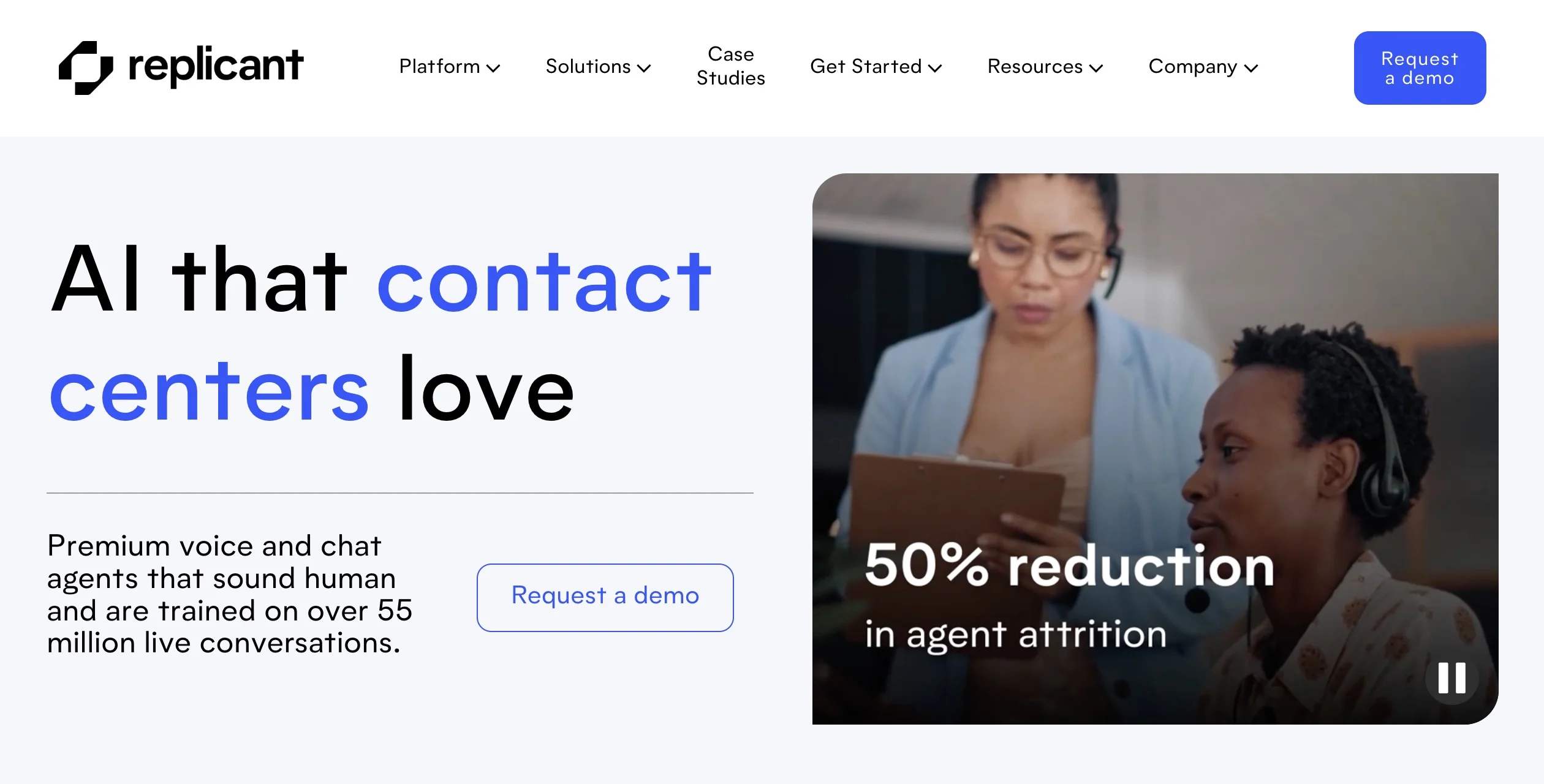
Replicant is an enterprise-grade automation platform for contact centers.
Its “Thinking Machine” resolves Tier-1 customer calls autonomously, escalates to live agents when needed, and integrates with backend systems to complete workflows. The platform includes analytics and conversation intelligence tools for optimizing performance at scale.
Advantages Compared to Synthflow:
- True omnichannel orchestration: Replicant supports voice, chat, SMS (and more) in a unified platform with seamless handoffs across channels.
- Low latency voice responses: Replicant report media access latency under 1 second for conversational turns (versus vendor averages of 3+ seconds) through optimized infrastructure.
- Rich conversation intelligence: Because Replicant analyzes all audio (tone, pauses, sentiment) and offers real-time insights and dashboards, it can deliver deeper analytics than basic post-call summaries.
- Advanced features for customer service operations: Replicant offers advanced features designed to enhance customer service operations and customer support, including a robust ai voice agent that can be rapidly deployed for simple or complex scenarios, real time coaching for instant feedback during live calls, and multi-voice capabilities to support large-scale customer interactions.
- Prebuilt contact center integrations: Replicant provides built-in connectors (e.g. CCaaS, CRM) for faster deployment into existing contact center infrastructure.
- Enterprise-level compliance & security: They mention adherence to GDPR, HIPAA, and PCI standards, with guardrails, secure deployments, and redundancy.
Pricing
Replicant does not publish pricing publicly. Engagements are structured as enterprise contracts, tailored to call volumes and complexity. Replicant uses custom pricing for enterprise clients, so you will need to contact their sales team for a personalized quote.
G2 Rating: 4.7/5 (45 reviews)
Review: “The team is quick to reply if there are any technical concerns and is open to feedback. They usually respond within an hour when a ticket is sent in”.
Recommended For:
Large-scale contact centers that want to automate high call volumes end-to-end, with the support of an established vendor in the voice automation space.
9. Sierra AI

Sierra AI deploys advanced AI agents for customer service that are uniquely trained to align with a company's specific brand identity.
These agents can reason, predict, and take action not just based on a knowledge base, but also by adhering to the company’s tone, values, and policies for a highly personalized interaction.
Advantages compared to Synthflow:
- Omnichannel by design: Sierra promotes its agents as usable across voice, chat, email, SMS, and more, enabling a “build once, run everywhere” model.
- Actionable AI agents: Sierra agents are built to act (update subscriptions, process orders, interface with order management systems or CRM) beyond just conversational responses.
- Adaptive learning & feedback loops: Sierra emphasizes continuous improvement through analytics, auditing, and reasoning pipelines (including “supervisor” models that monitor answer quality).
- Enhance customer interactions & satisfaction: Sierra's AI assistant is designed to enhance customer interactions across all channels, improving communication quality and operational efficiency, which leads to higher customer satisfaction.
- Security, governance & data controls: Sierra enforces strong data governance, encryption, auditing, and guardrails so the AI behaves within set policies.
- Outcome-based pricing model: Sierra claims a pricing model tied to successful resolution or outcomes, aligning cost with delivered value rather than raw usage.
- Rapid onboarding & setup: Sierra is marketed as enabling businesses to deploy their branded AI agents quickly, with default toolkits and guardrails.
G2 Rating: 4.3/5 (12 reviews)
Review: “User friendly, fast and many supported languages. Very complex setup process and more bugs then competitors”.
Pricing
Sierra’s pricing begins at approximately $150,000 annually, making it a more cost-effective alternative for sophisticated AI.
Sierra uses custom pricing, with final costs customized based on agent complexity and expected interaction volume. This structure provides a lower total cost of ownership compared to Kore.ai while delivering powerful, brand-aligned automation.
Recommended for:
Customer-centric brands where a consistent voice and adherence to company policy are critical, especially in telecommunications and financial services managing diverse customer segments.
10. ElevenLabs
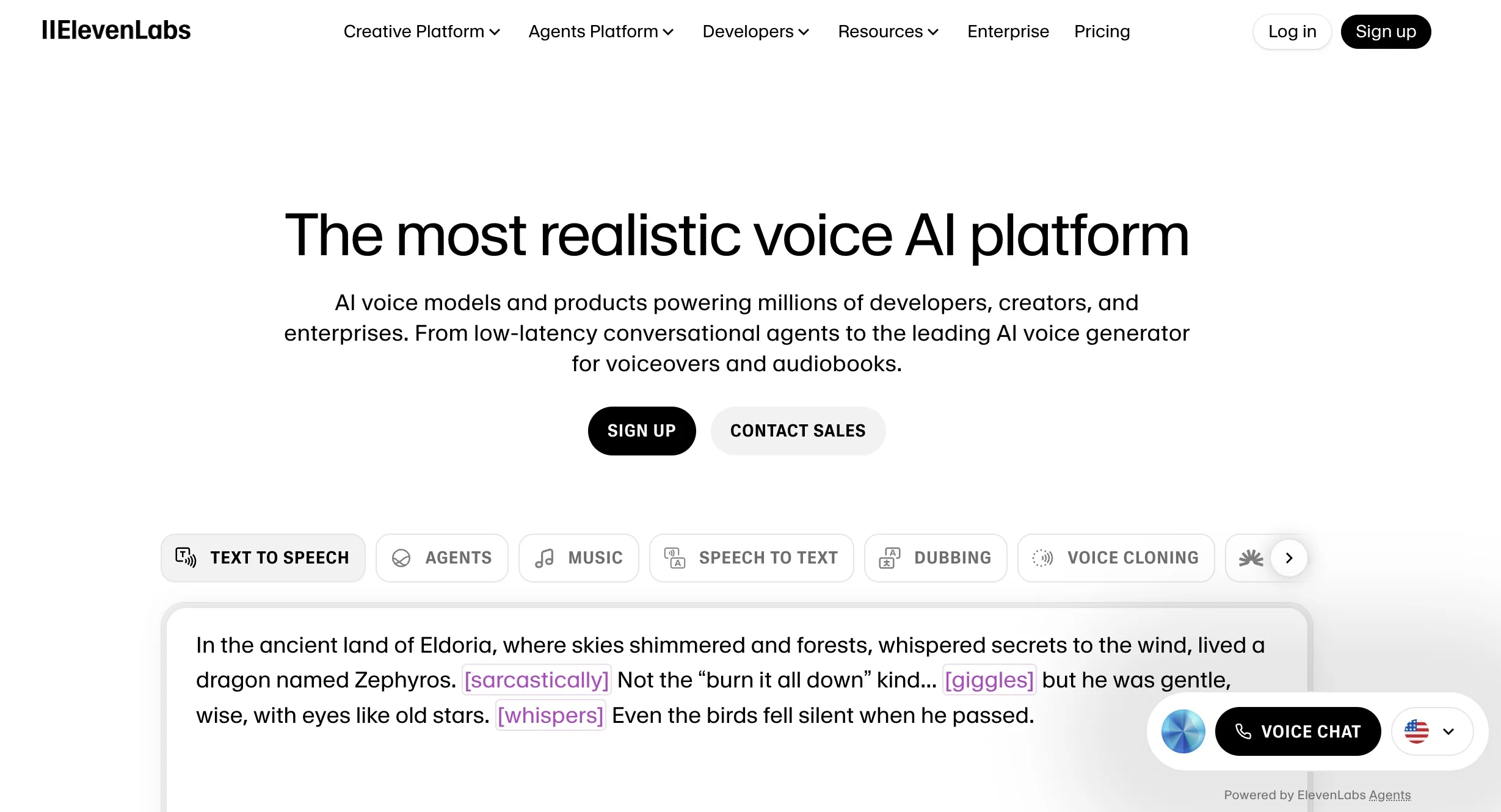
ElevenLabs is best known for its world-class text-to-speech and voice cloning tech, and more recently it’s expanded into conversational AI agents. Their platform can take user input (voice or text), ground it in your data, and produce natural spoken replies.
It’s not yet a full-blown telephony agent system, but it bridges content and voice interaction nicely, especially for brands already working in audio, narration, or voice experiences.
Advantages compared to Synthflow
- Superior voice realism & expressiveness: ElevenLabs is widely recognized for producing extremely natural, emotionally nuanced speech, voices that don’t feel flat or robotic.
- Customizable voices for diverse applications: ElevenLabs offers highly customizable voices, allowing businesses to tailor AI voice agents for phone call systems, IVR, and answering bots across multiple industries.
- Advanced ai models & machine learning: Their platform leverages state-of-the-art ai models and machine learning to enhance natural language understanding, conversation analysis, and automation, resulting in more accurate and intelligent AI-driven tools.
- Multimodal text + voice support in one agent: Their Conversational AI 2.0 enables agents to handle both voice and text (or a mix), so you can build hybrid agents without separate stacks.
- Bring-Your-Own-LLM + integration flexibility: You can swap in your own LLM or integrate retrieval-augmented generation (RAG), giving you tighter control over content, knowledge sources, and logic.
- Automatic language detection & multilingual fluency: Agents can detect the user’s spoken language on the fly and respond appropriately across multiple languages without heavy preconfiguration.
Pricing
ElevenLabs uses a credit system. You get a bundle of credits (usable for TTS, agents, etc.), and if you exceed them, you buy more.
Example tiers (as of now):
- Free: 10,000 credits / month (≈10 minutes of high-quality TTS or 15 minutes of agent use)
- Starter: $5/month for 30,000 credits
- Creator / Pro / Business / Enterprise: stepping up to 100k, 500k, millions of credits with higher-quality audio, API priority, SLA, etc.
Because it’s usage-based, your total cost will depend heavily on how many agent minutes you use, how much audio you generate, and how premium the voices are.
Recommended for:
If your product or brand already has a voice or audio focus (podcasts, narration, gaming, or voice apps) and you want to layer in conversational agents, ElevenLabs is a powerful pick. It’s especially strong when you care deeply about sound quality, expressiveness, and voice branding. But if your priority is full telephony integration, call switching, deep voice workflows, or super predictable pricing, Vapi (or others) might still lead in those domains.
Retell AI: The Right Synthflow Alternative
The voice automation landscape is evolving fast, and every platform here fills a specific niche.
Some excel in narrow areas, like ultra-realistic voices, complex orchestration, or heavy enterprise compliance, but few manage to balance all three without trade-offs in speed, cost, or control.
From our perspective, that’s where Retell AI truly stands apart.
We’ve built it to deliver sub-second latency, transparent pay-as-you-go pricing, and a no-code builder that’s powerful enough for developers yet intuitive for anyone to use.
Every call is tracked, analyzed, and summarized automatically, giving you real visibility into performance, without hidden fees or opaque contracts.
Retell AI and similar platforms are helping businesses stop missing calls, improve lead generation, and enhance customer interactions, through AI receptionists and other automated voice agents that operate 24/7, driving higher customer satisfaction.
If you’re ready to move fast, scale confidently, and own your automation stack end-to-end, Retell AI is the most practical and future-ready alternative to Synthflow, not just for today’s calls, but for the next generation of voice-driven businesses.
See how much your business could save by switching to AI-powered voice agents.
Your submission has been sent to your email
ROI Result
Total Human Agent Cost
AI Agent Cost
Estimated Savings
A Demo Phone Number From Retell Clinic Office

